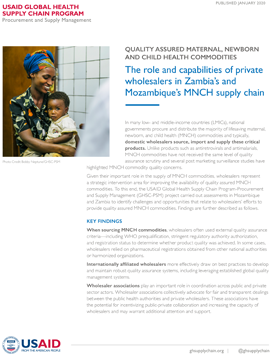
Wholesaler Capacity to Provide Quality Assured Maternal, Newborn and Child Commodities .
Fact Sheet | October 14, 2020

Wholesalers can improve the availability and quality of maternal, newborn, and child (MNCH). The USAID Global Health Supply Chain Program-Procurement and Supply Management (GHSC-PSM) project helped identify wholesalers’ challenges and opportunities.
In many low- and middle-income countries (LMICs), national governments procure and distribute the majority of lifesaving MNCH commodities and typically, domestic wholesalers’ source, import and supply these critical products. Unlike products such as antiretrovirals and antimalarials, MNCH commodities have not received the same level of quality assurance scrutiny and several post marketing surveillance studies have highlighted MNCH commodity quality concerns. GHSC-PSM carried out assessments in Mozambique and Zambia to identify challenges and opportunities that relate to wholesalers’ efforts to provide quality assured MNCH commodities. The project found that when sourcing MNCH commodities, wholesalers often used external quality assurance criteria. Findings also showed that internationally affiliated wholesalers more effectively draw on best practices to develop and maintain quality assurance systems. Additionally, the project found that wholesaler associations play an important role in coordination about the public and private sectors. Finally, findings showed that wholesalers in both countries indicated experiencing challenges when supply MNCH commodities. While the assessments found that some quality systems were in place, capacity to maintain internationally recognized best practices was variable and often limited. Wholesalers with international linkages should be considered models for other wholesalers, and wholesaler associations serve as a platform for quality assurance capacity building.
